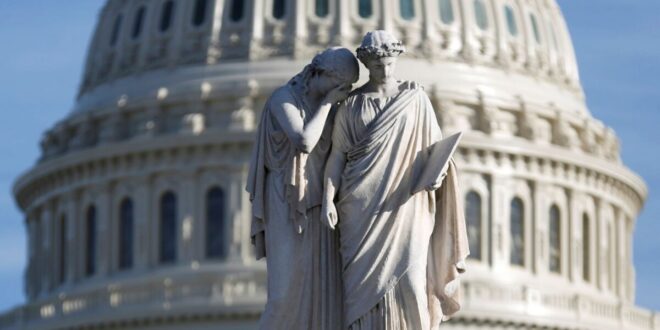Multiple crises and dangerous decisions by bad actors are all harming the stability of the United States as a democracy.
Any doubts about Russia’s interference in the 2016 U.S. election should have been laid to rest long ago, after voluminous press reporting, intelligenceassessments, and congressional reports on the subject. But additional confirmation and details keep appearing. The most recent detail, addressed in a Treasury Department statement about sanctions, is that top officials in the Trump presidential campaign provided campaign polling data to a Russian associate who was an agent of the Russian intelligence service.
The resistance to acknowledging the reality of the Russian interference has had two sources. One is the refusal of Donald Trump and his supporters to accept that the Russian activity could have played any role in his election victory. The other, centered on the political left, is the apparent fear that anything that paints Russia in nefarious colors risks feeding a dangerous escalation of U.S.-Russian tensions.
The resistance, especially among Trump’s supporters, often used the rallying cry “No collusion!” This always was something of a straw man in that the main reality to be acknowledged was that Russia conducted a large and multifaceted effort to influence the U.S. election, whether or not any of that effort involved direct cooperation with either of the presidential candidates’ campaigns.
But it turns out that there really was collusion, too. It always was hard to justify not applying that word to the infamous meeting at Trump Tower in which Trump campaign officials and family members sought dirt on their political opponent from a Russian with ties to the Kremlin. Now we know that there not only was the wish for Russia to share material with the Trump campaign but also the reality of the campaign sharing material with Russia.
As for the fear of stoking U.S.-Russian confrontation, no acknowledgment of the election interference precludes the sort of well-informed debate about U.S. policy toward Russia that does and should take place. Many other issues and considerations are at least as important in guiding that debate. But all relevant considerations, including the election interference, need to be acknowledged and considered.
Any interference by foreign states in U.S. elections is a problem for American democracy. As such, it should be considered within the larger picture of all of American democracy’s maladies. That picture is not pretty.
In the most recent scorecard of “global freedom” by the watchdog organization Freedom House, the United States ranks only 55th in the world. It not only is well behind the advanced western democracies that are at or near the top of this list, but also behind the likes of Grenada, Mauritius, and Mongolia. It is tied with Panama and Romania. The U.S. ranking is hurt especially by its poor showing regarding “political rights,” on which it ranks 72nd.
Foreign interference is far from being the biggest ailment afflicting democracy and political rights in America. The nation just endured a defeated incumbent president attempting to overturn the election result. He was supported in this attempt by most members of his party in the national legislature. Members of the same party are stripping state and local election officials of powers and taking other steps that could increase the likelihood that the next election-overturning attempt will succeed. This is in addition to a wave of new efforts to impede citizens’ exercise of their right to vote.
This picture increasingly resembles what is seen in banana republics even farther down the Freedom House list, in which whatever gang is in power manipulates votes, elections, and whatever else it needs to manipulate to retain that power.
In the United States, an underlying attitudinal phenomenon that has become increasingly severe over the past three decades and is especially prevalent on the political right is what social scientists call political sectarianism. This involves viewing political opponents not as fellow citizens who have different views about national policy but instead as despised, distrusted aliens who represent a threat to the nation and to morality. With such an attitude, even extreme and undemocratic methods begin to look justified as a means to keep opponents out of power.
Columnist David Brooks elaborates on current manifestations of this attitude, noting that “the hyperpopulist wing of the G.O.P. seems to be crashing through the floor of philosophic liberalism into an abyss of authoritarian impulsiveness.” What Trump stoked and exploited may be getting even worse after Trump’s presidency—“It’s as if the Trump base felt some security when their man was at the top, and that’s now gone.” Since the election, writes Brooks, “large swathes of the Trumpian right have decided America is facing a crisis like never before and they are the small army of warriors fighting with Alamo-like desperation to ensure the survival of the country as they conceive it.”
With much of the citizenry locked into such a mindset, which is incompatible with liberal democracy, Russian election interference is among the lesser of the worries for those who cherish American democracy—and Russia isn’t even the most active perpetrator of interference in U.S. politics. But just as the foreign interference should be part of the larger picture of dealing with the problem of Russia, so too should it be part of the larger picture of problems of American democracy.
The connection between foreign and domestic threats to American democracy goes even beyond that. The sectarian perception of political opponents as aliens puts them on the same plane as foreign adversaries and makes them seem just as threatening—or even more so, because they are closer to home. If Vladimir Putin is seen as no worse than an American Democrat, there is no compunction about accepting the help of the former to defeat the latter.
And the domestic crisis of American democracy comes full circle as a problem in U.S. foreign policy. Ranking 55th in global freedom does not make a nation the leader of the free world. It certainly raises questions about a country’s credibility when it talks about democracy, and in the eyes of the world it calls into question what the United States stands for.
Paul R. Pillar is a contributing editor at the National Interest and the author of Why America Misunderstands the World.
Image: Reuters.
 Geostrategic Media Political Commentary, Analysis, Security, Defense
Geostrategic Media Political Commentary, Analysis, Security, Defense





